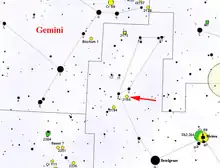| NGC 2169 | |
|---|---|
 | |
| Observation data (J2000 epoch) | |
| Right ascension | 06h 8.4m |
| Declination | +13° 57′ |
| Distance | 3.6 kly |
| Apparent magnitude (V) | 5.9 |
| Apparent dimensions (V) | 7′ |
| Physical characteristics | |
| Other designations | 37 Cluster, Cr 38/83 |
| Associations | |
| Constellation | Orion |

Map showing the location of NGC 2169
NGC 2169 is an open cluster in the Orion constellation. It was possibly discovered by Giovanni Batista Hodierna before 1654 and discovered by William Herschel on October 15, 1784.[1] NGC 2169 is at a distance of about 3,600 light years away from Earth. It is nicknamed "The '37' Cluster" due to its striking resemblance to the numerals "37".[2] The cluster is composed of components Collinder 38, a I3pn open cluster,[3] and Collinder 83, a III3m open cluster.

NGC 2169 from Scottsdale AZ
References
- ↑ O'Meara, Stephen James (2007). Deep Sky Companions: Hidden Treasures. Cambridge University Press. p. 180. ISBN 9780521837040.
- ↑ Constellation Guide, Orion Constellation (accessed 2014-03-03)
- ↑ Backyard Astronomy for Amateur Astronomers, "Collinder 38" Archived 2016-04-14 at the Wayback Machine (accessed 2014-03-03)
External links
 Media related to NGC 2169 at Wikimedia Commons
Media related to NGC 2169 at Wikimedia Commons- SEDS entry
- NASA Astronomy Picture of the Day: The 37 Cluster (18 November 2005)
- NGC 2169 on WikiSky: DSS2, SDSS, GALEX, IRAS, Hydrogen α, X-Ray, Astrophoto, Sky Map, Articles and images
This article is issued from Wikipedia. The text is licensed under Creative Commons - Attribution - Sharealike. Additional terms may apply for the media files.